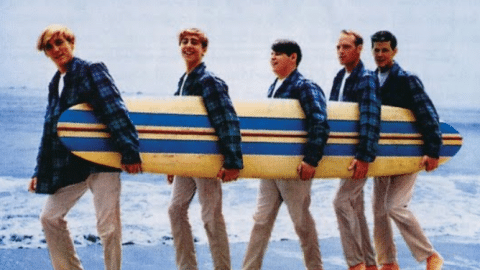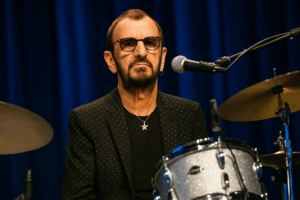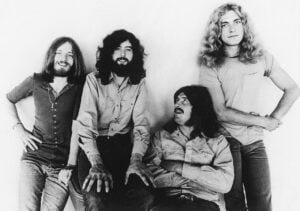10 Seemingly Innocent Songs That Became Controversial

via The Beach Boys / YouTube
Songs have always been a window into popular culture, full of stories, emotions, and even controversy. They capture the highs and lows of a generation, giving us an escape while sometimes sparking debates. Believe it or not, some tracks were so provocative they got banned—often for reasons you’d never expect. This list dives into the surprising stories behind songs that stirred the pot and caught people off guard.
‘In The Air Tonight’ Got Banned During the Gulf War—Yes, Really!
Phil Collins’s debut solo hit, “In The Air Tonight,” made waves when it was released in January 1981 as part of his album Face Value. Inspired by the emotions of his divorce, Collins told Rolling Stone in 2016, “One day I was working on a piece in D-minor, the saddest [key] of all. I just wrote a sequence, and it sounded nice. I wrote the lyrics spontaneously. I’m not quite sure what the song is about, but there’s a lot of anger, a lot of despair, and a lot of frustration.”
Surprisingly, the song was banned during the Gulf War in the 1990s. Radio stations feared its lyrics might be misinterpreted as referencing Scud missiles “in the air tonight.” While the connection seems far-fetched—there’s no mention of violence or war—the concern was enough to get it pulled.
Rod Stewart’s ‘Sailing’ Was Banned During the Falklands War
Rod Stewart’s “Sailing” became a hit in 1975, even though he didn’t write it—it’s actually a Sutherland Brothers original. Stewart’s version, however, is the one everyone knows. For years, the song was celebrated, but during the Falklands War in the 1980s, the BBC unexpectedly banned it.
The trouble began when “Sailing” was played over a PA system on the war’s third day. The BBC decided the song’s theme of life at sea was too sensitive during a military conflict. Oddly enough, the lyrics have nothing to do with war, but that didn’t stop the ban. Stewart’s heartfelt tune about freedom and longing got tangled up in an entirely different kind of battle.
‘Rumble’ Made History as the Only Instrumental Banned from Radio
Link Wray’s “Rumble” is the kind of guitar instrumental you’ve probably heard without realizing it. Known for its raw, moody vibe, it’s been featured in countless films, including Quentin Tarantino classics. Yet, despite being purely instrumental, “Rumble” holds the odd distinction of being the only instrumental track ever banned from radio.
The reason? Critics claimed it made kids “go ape” and feared its gritty, rebellious tone could incite gang violence. Iggy Pop once called it “a soundtrack to a knife fight,” and its influence ran deep. “It pre-figured everything you heard after from AC/DC, the West Coast Glam bands, and punk rock,” Pop explained. He even credited it with inspiring Pete Townshend of The Who.
Though “Rumble” has no lyrics, its driving power and attitude made it a cultural milestone. By the late 1950s, radio stations in cities like New York and Boston refused to play it, worried about its impact on youth.
‘Brown Eyed Girl’ Challenged Racial Norms in the 1960s
Van Morrison’s “Brown Eyed Girl” dropped in March 1967, quickly climbing to #10 on the Billboard Hot 100 and staying there for 16 weeks. It’s one of those timeless tracks everyone knows, but its popularity didn’t stop it from stirring controversy at the time.
Radio stations across the U.S. banned the song over a single line: “Making love in the green grass.” Oddly, it wasn’t the implied intimacy that caused a stir—this was the late ‘60s, after all—but the belief that the lyric referred to an interracial couple. Originally titled “Brown Skinned Girl,” the song’s subtle challenge to racial prejudices made it a lightning rod for controversy.
Even though the track became Morrison’s signature hit, he wasn’t too fond of it. “I didn’t perform [it] for a long time because, for me, it was like a throwaway song,” he told Time magazine. “I’ve got about 300 other songs I think are better than that.”
‘God Only Knows’ Stirred Controversy in the Religious South
The Beach Boys weren’t exactly known for controversy, but their iconic song “God Only Knows” managed to ruffle feathers in the deeply religious Southern U.S. Released in 1966 as part of the groundbreaking Pet Sounds album, it’s widely regarded as one of the band’s greatest achievements. But not everyone was ready to embrace it.
The issue? The mere mention of “God” in the title was enough for some Southern radio stations to ban it from the airwaves. Despite this backlash, “God Only Knows” has earned its place as one of the most beloved songs of all time. Paul McCartney himself called it “one of the few songs that reduces me to tears every time I hear it.” He added, “It’s really just a love song, but it’s brilliantly done. It shows the genius of Brian [Wilson].”
Even McCartney admitted the song’s emotional power overwhelmed him during a soundcheck with Wilson: “I broke down… It was just too much to stand there singing this song that does my head in and to stand there singing it with Brian.”
Co-writer Tony Asher reflected on its boldness in an interview with Goldmine, noting, “We were taking some real chances with it. First of all, the lyric opens by saying, ‘I may not always love you,’ which is a very unusual way to start a love song.”
For a song that’s now universally adored, it’s hard to believe it once faced such resistance.
Lyrics of ‘Louie Louie’ Sparked a Surprising Teen-Led Controversy
When The Kingsmen released their version of Richard Berry’s “Louie Louie” in 1963, they probably didn’t expect it to become one of the most iconic—and controversial—rock songs of the decade. The track, with its raw, garage-band energy, tells a simple story of a Jamaican sailor longing to return to his lover. But despite its innocent premise, it somehow offended two Indiana teenagers enough to spark a full-blown moral panic.
The teens wrote to Governor Matthew Welsh, claiming the song’s lyrics were inappropriate. Welsh listened and agreed, calling the song “dirty.” He reached out to the FCC, the Indiana Broadcasters Association, and even the US Postal Service to investigate and pull the song from airplay. The case escalated quickly, involving the FBI and the US Justice Department in what became an over-the-top examination of the supposedly offensive lyrics.
The teenagers followed up with a letter praising Welsh: “You should be given a round of applause for your strong stand against this record. Much is written about the declining morals of the American teenager… and it is because of smut such as this record.”
Ironically, the uproar only boosted the song’s popularity, catapulting The Kingsmen to stardom. Fans even embraced the track as a rebellious anthem. The controversy eventually faded, but “Louie Louie” remains a classic, forever tied to a bizarre chapter in Indiana’s cultural history.
The Who’s ‘My Generation’ Stirred Up Controversy for Its Stutter
The Who’s “My Generation” is one of the most iconic rock songs ever, earning a place on countless “greatest of all time” lists. Released in October 1965, it quickly climbed the charts in both the UK and US, becoming the band’s signature anthem. But its rise wasn’t without drama—it was banned by the BBC shortly after its release.
Surprisingly, the issue wasn’t with the lyrics themselves but Roger Daltrey’s stuttering delivery. The BBC considered it potentially offensive to people with speech impediments and pulled the song from its airwaves. However, overwhelming public demand eventually forced them to lift the ban.
Interestingly, the stutter wasn’t accidental. In his 2012 autobiography, Who I Am, Pete Townshend explained how it came to be: “Chris picked up on a stutter on my vocal on the second demo, so I played him John Lee Hooker’s ‘Stuttering Blues.’ Roger had been experimenting with stuttering on stage ever since Sonny Boy Williamson Jr. joined us… We experimented until the stutter became exaggerated and obvious.”
Far from a mistake, the stutter became a defining feature of the song, which amplified its rebellious, in-your-face energy. What started as a controversial quirk now stands as a key element of a rock classic that remains well-loved until today.
One Word in ‘Lola’ Led to a BBC Ban
The Kinks’ “Lola” became an instant hit when it was released in 1970 as part of Lola Versus Powerman and the Moneygoround, Part One. Known for its catchy melody and daring storyline about a romantic encounter with a possible trans woman, the song is one of the band’s most iconic tracks. But despite its success, “Lola” hit a roadblock with the BBC—not because of its subject matter, but because of one specific word: Coca-Cola.
The BBC considered the mention of the brand to be an act of embedded advertising, which violated its strict broadcasting guidelines. As a result, the band had to re-record the song, swapping “Coca-Cola” for the more generic “cherry cola.” Both versions exist today, but it’s the reworked one that made it onto the airwaves.
Reflecting on the song, lead guitarist and co-founder Dave Davies told Under the Radar: “I love it! I’ve always loved that song… It’s got country influences and I think it’s a fun track. But it’s also about growing up and experimenting with ideas and trying to find a sexual identity when you’re young… It was a lot of growing up in the music business. It’s very intense, very.”
What started as a quirky branding issue made “Lola” a timeless anthem of self-discovery and musical creativity.
‘Radio Radio’ Got Elvis Costello Banned From ‘SNL’
Elvis Costello’s “Radio Radio” caused quite a stir when he performed it live on Saturday Night Live in 1977. Originally scheduled to perform “Less Than Zero,” Costello threw a curveball by switching songs at the last minute. His surprise move upset both his record company and SNL, leading to the song being banned from the show. As a result, Costello was also banned from returning.
Years later, in an interview with Apple Music’s Zane Lowe, Costello explained: “I didn’t really have anything against the show. I was more pissed off at being told what to play by the record company than I was NBC, truthfully. I can’t remember whether I said what I was going to do, but I think I just said, ‘Watch me.’”
Despite the controversy, Costello eventually returned to SNL, proving that sometimes, a little rebellion can make for unforgettable TV moments.
“A Day in the Life” Was Banned For A Supposed Drug Reference
The Beatles were no strangers to controversy, and while their music challenged the norms, not every ban made sense. A prime example is “A Day in the Life,” the final track from their iconic 1967 album Sgt. Pepper’s Lonely Hearts Club Band. When the song was released, the BBC quickly decided to ban it. This was especially significant in 1967, as The Beatles were at the peak of their fame.
The BBC was cautious about lyrics that might be seen as promoting the drug counterculture, particularly since The Beatles were known for their “experiments” with LSD. The trigger for the ban was a line from the song: “I’d love to turn you on.” The BBC feared that this line, followed by a rising crescendo of sounds, might encourage drug use. In May of 1967, Frank Gillard, the BBC’s director of sound broadcasting, sent the band a letter explaining the decision:
“We have listened to it over and over again with great care, and we cannot avoid coming to the conclusion that the words ‘I’d love to turn you on,’ followed by that mounting montage of sound, could have a rather sinister meaning. The recording may have been made in innocence and good faith, but we must take account of the interpretation that many young people would inevitably put upon it. ‘Turned on’ is a phrase which can be used in many different circumstances, but it is currently much in vogue in the jargon of the drug addicts.”
John Lennon, however, quickly shot down the idea that the song had anything to do with drugs. He explained the true meaning behind the lyrics:
“I was reading the paper one day and noticed two stories. One was about the Guinness heir who killed himself in a car crash. On the next page was a story about four thousand potholes in the streets of Blackburn, Lancashire, that needed to be filled. Paul’s contribution was the beautiful little lick in the song, ‘I’d love to turn you on,’ that he’d had floating around in his head and couldn’t use. I thought it was a damn good piece of work.”
Despite the BBC’s ban, “A Day in the Life” remains one of The Beatles’ most celebrated songs. The bottom line, sometimes the meaning behind a song can get lost in interpretation.






















